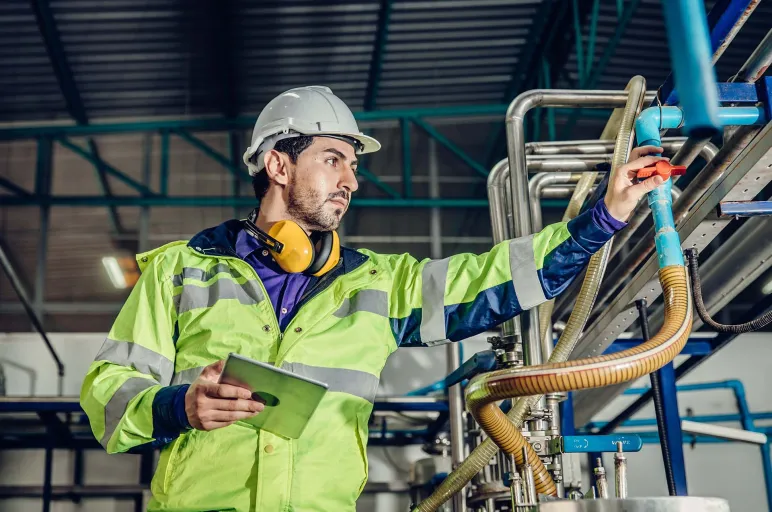
Why Engaging with Startups is a necessity in the Chemical Industry
- The chemical industry is struggling to adapt as regulations reshape product requirements.
- Startups are enabling faster shifts to compliant materials and cleaner production methods.
- Early partnerships with these startups are shifting market share toward faster, more adaptive incumbents.
September 02, 2025 | Procurement Strategy 5 minutes read
Chemical companies are under pressure from every direction.
New regulations on carbon, hazardous materials, and waste are forcing them to revisit long-standing production models. Advances in catalysis, process intensification, molecular design, and digital chemistry are changing how chemicals are developed and brought to market. Customers now expect safer formulations that meet both performance and sustainability goals.
Meeting these demands requires faster innovation and a move toward renewable or circular feedstocks. Startups are becoming key collaborators in how the industry adapts and modernizes.
Agile and specialized, they bring breakthrough capabilities in green solvents, enzymatic synthesis, AI-assisted R&D, chemical recycling, and low-carbon feedstocks. Collaborating with these innovators offers established companies a faster path to decarbonization, compliance, product differentiation, and growth.
Why It’s the Right Time for Collaboration
The pressure to adapt is growing.
Regulatory demands, raw material volatility, and decarbonization pressures are reshaping the industry.
At the same time, digital technologies like AI-guided formulation, real-time process monitoring, and automation, are changing how chemicals are developed and optimized. Many of these solutions are coming from startups focused on bio-based inputs, closed-loop systems, and cleaner synthesis routes.
For chemical companies, these collaborations are becoming key to innovation and long-term market relevance.
Chemical Startup Snapshot
| No. of operating startups (as of 2025) | 4,800 |
| Startups launched/year (2015-2025) | 164 |
What Do Startups Bring to the Table?
1. Industry Disruption and Innovation
New technologies are helping manufacturers improve yields, cut waste, and bring products to market more quickly. These are critical advantages in an industry where development timelines are long and infrastructure is costly.
• AI in Process Optimization
AI companies like Citrine Informatics have reduced formulation cycles by 50-70% in developing lithium-ion secondary batteries (LiBs), fragrances, etc.
• Predictive Maintenance with IoT
Chemical plants using predictive analytics (like UReason) have achieved up to 50% reduction in unplanned downtime and 30-40% cost savings in maintenance across units producing ammonia, ethylene, acrylonitrile.
These technologies are helping manufacturers move from legacy systems to more efficient, responsive operations.
2. Global Competition and Market Opportunities
Emerging markets in Asia, Africa, and Latin America are driving demand growth in segments like agrochemicals, construction, and packaging. To meet this demand, startups are offering localized solutions — from low-VOC coatings to recyclable polymers and sustainable fertilizers. Partnerships allow incumbents to deliver tailored products and grow into regional opportunities faster.
Some recent examples:
• Minimalist (acquired by Unilever)
A startup focused on science-backed skincare solutions.
• Genomatica + Cargill + Unilever (Joint Development)
Commercialized 1,3-propanediol from renewable feedstocks.
• Bluepha + Evonik (Strategic Partnership)
Developing and scaling biopolymer PHA production.
• TotalEnergies + Twelve + LLNL (Joint development)
collaborating to develop one-step electrochemical CO₂-to-ethylene conversion.
• L'Oréal + Evonik + Abolis (strategic partnership)
developing bio-based, sustainable ingredients for beauty products.
3. Sustainability
Sustainability is now a priority for the chemical industry because of regulations such as the EU Green Deal and Carbon Border Adjustment Mechanism (CBAM), and rising demand for low-carbon, circular products. This means reducing emissions, phasing out hazardous inputs, and adopting alternative feedstocks.
The risks of inaction are real. Falling behind on sustainability can lead to penalties, reduced market access, or loss of major buyers.
Startups are accelerating this transition with chemistry-specific innovations:
- Solugen produces hydrogen peroxide using bio-based feedstocks with near-zero emissions.
- Carbon Clean enables compact carbon capture systems for chemical production plants.
Working with these startups allows firms to meet regulations and compete in markets that increasingly favor low environmental impact materials like bio-based solvents, polymers, and surfactants.
4. AI in Cost Efficiency and Digital Transformation
Digital transformation is becoming a priority for chemical companies looking to lower costs and address process variability. Given the complexity of reactions and the capital-intensive nature of operations, the industry is well-positioned to benefit from AI, machine learning, and advanced analytics.
Technologies like process digital twins, real-time sensors, and AI-led optimization are being used in areas such as polymerization and catalyst tuning. These tools are helping teams improve consistency while reducing downtime.
Examples include:
- SCG Chemicals (Thailand): Used AI-driven predictive maintenance to boost equipment reliability and achieved 9× ROI in six months.
- Dow Chemical: Used IoT-based predictive maintenance which improved production reliability by 40%, saved 1,000 tons in material costs annually, and cut water usage by 25%.
- Evonik reduced unplanned downtime by 30–40% using predictive maintenance algorithms.
- BASF leverages AI to improve catalyst efficiency and reduce raw material usage.
Startups are accelerating this shift with solutions like: - Predictive supply chain analytics
- Machine vision for defect detection
- AI-based formulation tools for faster R&D and compliance
These partnerships allow chemical firms to move faster on digitization and make better use of data where it matters most — in real operations.
5. Competitive Investment Environment
There is substantial capital available for startups with strong technical value. Early engagement gives chemical companies access to promising innovations while they’re still taking shape. Waiting too long increases the risk of being locked out or having to pay more to adopt the same technology later.
The Cost of Delay
In the chemical industry, where product development is long and operations are capital-intensive, speed and adaptability are now critical. Companies that delay engaging with startups risk being outpaced by agile players introducing bio-based alternatives, advanced materials, and circular production models.
Potential risks include:
- Losing 15–20% market share to sustainable or high-performance substitutes by 2027.
- Non-compliance with evolving regulations such as REACH and CBAM, resulting in penalties and product restrictions.
Established players that want to avoid these outcomes will need to build structured startup engagement into their growth plans.
Engagement Strategies
1. Targeting Intellectual Property (IP) and Talent
Collaborate or acquire startups to access unique technologies, patents, and specialized talent, accelerating innovation and gaining a competitive edge.
2. Corporate Venture Capital (CVC)
Invest in strategically aligned startups to gain early access to innovation, influence development, and capture financial returns.
3. Collaborative R&D
Partner with startups on joint research projects to combine scale with agility, speeding up product development and reducing risk.
4. Ecosystem and Open Innovation
Build platforms that connect startups, academia, and industry, fostering collaboration and driving diverse solutions.
5. Incubators and Accelerators
Support early-stage startups with resources and mentorship, while gaining early access to emerging technologies.
6. Joint Ventures & Licensing
Form joint ventures or license startup technologies for faster commercialization and shared innovation responsibility.
7. Sustainability Partnerships
Collaborate with startups that focused on green chemistry and ESG goals to meet sustainability targets and boost eco-innovation.
8. Digital Integration
Adopt startup-led digital solutions to enhance operations, enable real-time decisions, and accelerate digital transformation.
Approach to Startup Partnerships: Lessons from Practice
In our experience, successful collaboration with startups involves identifying the right partners through focused innovation scouting, evaluating their capabilities and fit, and negotiating partnership terms that protect value, manage risk, and enable scalable growth.
Approach to Startup Partnerships
The chemical industry is entering a new era where traditional models are no longer sufficient to meet the demands of sustainability, digitalization, and market complexity.
Startups offer targeted innovations, including green chemistry approaches and AI-based process tools, that help companies adapt more quickly. By building structured collaborations, chemical firms can meet evolving expectations and help shape the next generation of chemical solutions.
Authors: Vishal Kumar and Bakorlang Myrthong
Watch for our next blog on case studies of successful startup partnerships in the chemical industry.
Sources and references:
- www.startus-insights.com/innovators-guide/chemical-industry-report
- tracxn.com/d/sectors/chemicals-and-materials-tech/__VJmYQwXo4Hb4wSe4NPSZVYckzNPVa2OXysPlQ2N0M2Y/companies
- www.accenture.com/in-en/insights/chemicals/chemical-growth-and-innovation
- economictimes.indiatimes.com/markets/stocks/news/hul-shares-in-focus-after-cci-approves-acquisition-of-skincare-brand-minimalist/articleshow/119139335.cms?from=mdr
- stackwealth.in/blog/news/hindustan-unilever-acquires-beauty-brand-minimalist
- www.energy.gov/eere/iedo/articles/partnerships-driving-innovation-chemical-manufacturing
- https://www.specialchem.com/cosmetics/news/loreal-evonik-and-abolis-partner-000235075
- https://www.watertechonline.com/wastewater/article/14214570/bio-based-additives-are-solving-performance-challenges-in-heavy-duty-water-treatment-formulations
- https://vizologi.com/business-strategy-canvas/solugen-business-model-canvas/
- https://www.carbonclean.com/en/press-releases/breakthrough-industrial-carbon-capture-solution
- https://engage.aveva.com/WS-CORP-2023-Q3-10-11-IAR-EN-unplanned-downtime-chemicals_webinarregistration-LP.html?
- https://moldstud.com/articles/p-leveraging-predictive-maintenance-ai-for-sustainable-operations?



